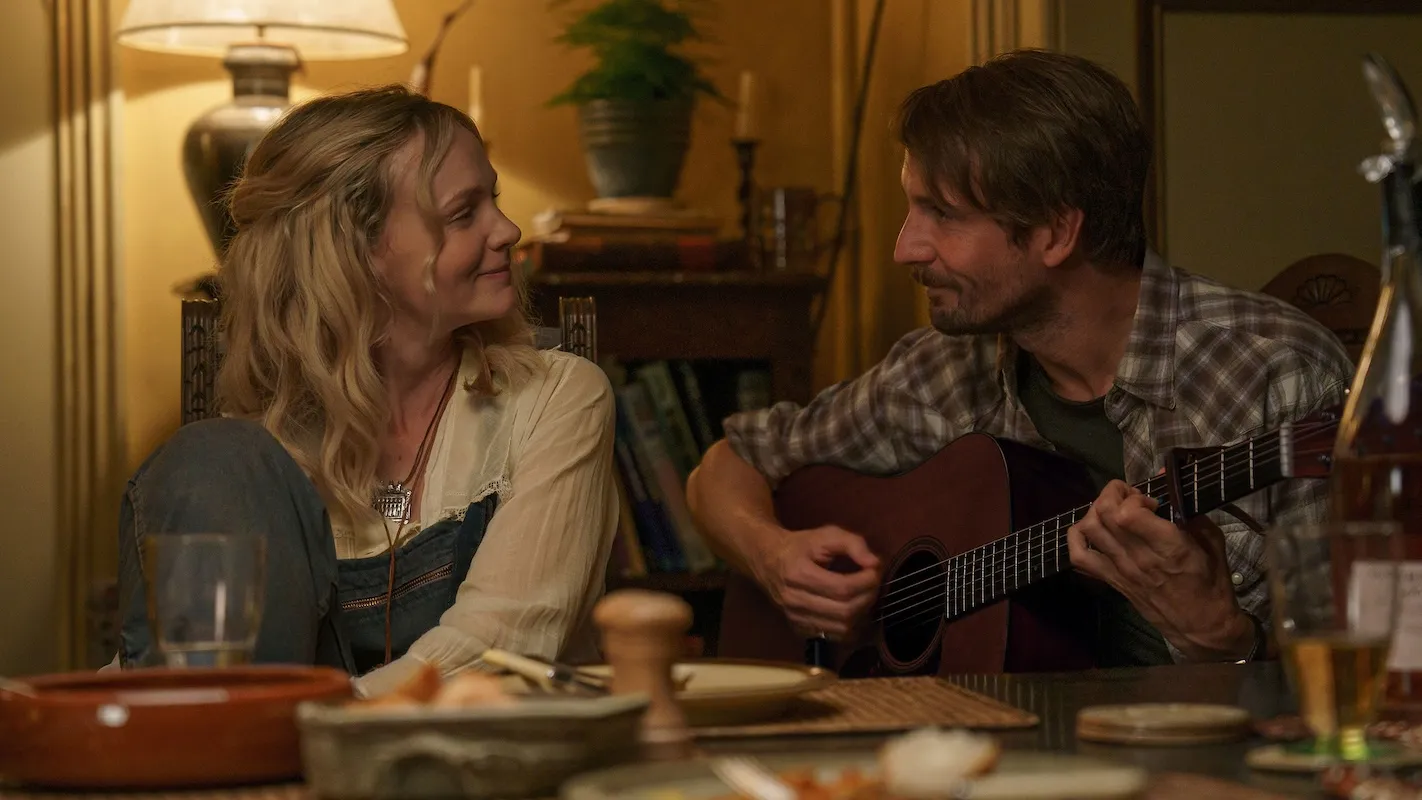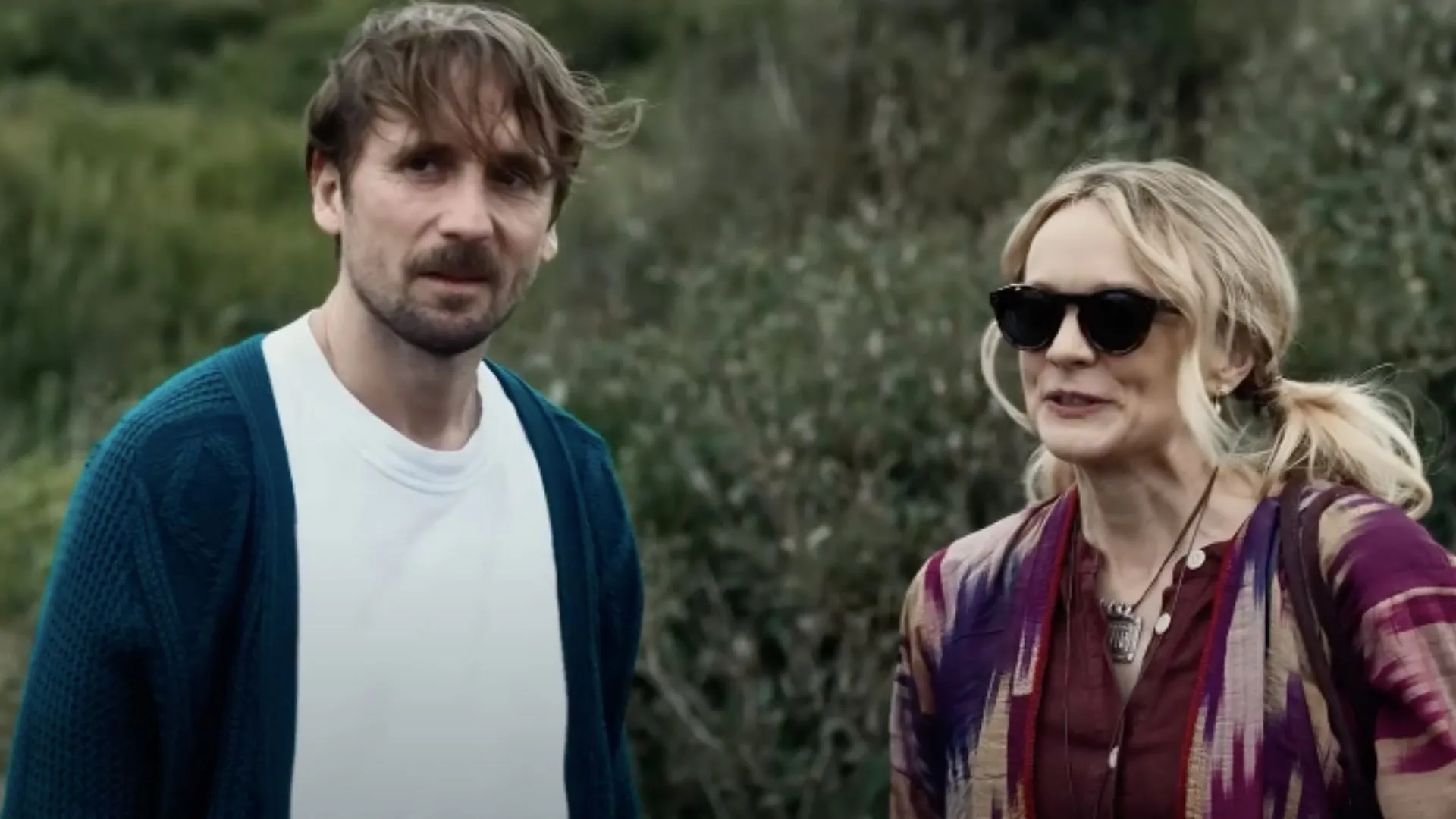The Ballad of Wallis Island” (2025) occupies a niche of “feel-good” cinema that has been strangely dormant within the past few years. Given how frequently mid-budget films aimed at adults are sent to streaming services, and how infrequent it is to see earnest character dramas that aren’t intended to be award season contenders, there is an aspect of “The Ballad of Wallis Island” that feels deliberately old-fashioned. It’s no coincidence that the film takes place in a secluded location in which technology and tourism culture seems to have been cut off in the 1980s; while it isn’t a period piece, “The Ballad of Wallis Island” goes out of its way to not invoke any aspects of modernism that could complicate its heartfelt premise.
“The Ballad of Wallis Island” centers on the washed-up folk singer Herb McGwyer (John Basden), who accepts an unusual letter from the proclaimed fan Charles (Tim Key), which offers him the opportunity to perform some of his classic hits for a rather sizable sum of cash. The years have not been kind to Herb, and so the opportunity to play for a crowd that has actual interest in his music is one that he can’t turn down. However, it becomes clear to Herb from the moment that he boats into the secluded Wallis Island that he doesn’t have a crowd waiting for him. It’s just Charles, a two-time lottery ticket winner who has used his spare cash to pay his favorite artists to give him a private performance.
Herb is more than a bit dubious about the offer, as he is unclear of what Charles’ intentions are. Wallis Island has only a few inhabitants, including the local store owner Amanda (Sian Clifford), who Charles appears to be smitten with. Although the town lacks the Internet connection and modern dining options that Herb had wished for, he only starts to really get irritated when he discovers that Charles has also invited his former bandmate, Nell Mortimer (Carey Mulligan). Although the two had once shared a passionate romantic relationship with one another during their initial wave of success, they have since separated, and haven’t spoken in nearly a decade. Any hopes that Herb may have had about a potential reconciliation are evaporated once Nell’s new husband Michael (Akemnji Ndifornyen) also shows up.

The character that “The Ballad of Wallis Island” most needed to nail was that of Charles; had Charles come off as too obsessive or knowledgeable about Herb’s past, the film could’ve been creepy, and a bit unnerving given the toxic ways in which fan culture has evolved. It’s no coincidence that Key serves as both the supporting actor and co-writer on the film, as it is evident that he had a clear concept for how Charles could both instigate the plot and warrant sympathy. Given the seclusion of the island, Charles is not an eccentric aristocrat who can solve any issues with money; rather, he is a lonely, albeit friendly man who wants to both give back to the artists that have inspired him and enjoy an opportunity that would have never been offered to him previously.
Charles’ behavior is by far the most entertaining aspect of “The Ballad of Wallis Island,” as while it is not suggested that he has any severe issues that would impede his ability to communicate, his removal from larger communities means that he is severely lacking in social skills. Charles speaks his mind and can’t lie to save his life, which makes it all the more challenging for Herb to gain any insight on what he could be thinking. Herb isn’t necessarily cynical, but he’s taken enough losses that he isn’t willing to invest in anything that seems too good to be true. The devastation he faces has nothing to do with Charles’ intentions, but that he may be the only person that still cares about his music.
If the series of awkward, dry exchanges between an upbeat Charles and an agitated Herb can occasionally grow tedious in their repetitive nature, the storyline that involves Nell does offer a more complicated assessment of how relationships evolve. “The Ballad of Wallis Island” is smart to not suggest that their initial breakup was a great tragedy, as it is evident that their very different mindsets would have never been sustainable for a marriage. However, Herb is constantly drawn to the idea of Nell that he has in his mind, as she reminds him of an era in which the future was not set in stone. The fact that she now has a husband, a career, and has dropped music from her life entirely heightens Herb’s anxieties that he has made a series of wrong decisions that have landed him in a perpetual state of arrested development.

The laughs in “The Ballad of Wallis Island” are frequent enough, if never particularly memorable, but that isn’t a major issue when the film is so gentle in its approach. The “all is lost” moments are authentically downbeat, but never devastating to an extravagant degree; the more triumphant scenes are charming, but they don’t point to a blindly optimistic outlook. The most difficult segment of the film, which centers on why exactly Charles is so lonely, is handled with a surprising degree of poignancy, suggesting that Key drew from something very personal in his conception of the character.
Although “The Ballad of Wallis Island” is largely static as a work of visual storytelling, the naturalistic environments captured offer as compelling a tourism venture as the one that Herb receives in the film. The quaint village of Wallis Island itself is well-defined, allowing director James Griffiths to make every corner of the island feel entirely real. Even if it was a matter of budgetary constraints, the decision to never leave the island itself ended up making the film feel like a folktale of sorts, which contains all the specific, yet timeless details that could have made up the lyrics to one of Herb’s songs.
“The Ballad of Wallis Island” adheres to a structure so vigorously that at times the lack of subversion feels like a bit of a twist; although viewers likely weren’t looking for a twist in a film as modest as this, they may find themselves patiently waiting for certain plot points to click into pace. Yet, there isn’t anything inherently wrong with a film that serves best as passive viewing, and “The Ballad of Wallis Island” is too refreshingly wholehearted to be criticized for its familiarity.




![What Doesn’t Kill Us [2018]: ‘Locarno’ Review](https://79468c92.delivery.rocketcdn.me/wp-content/uploads/2018/08/WHAT_DOESNT_KILL_US1.jpg)

![The Matrix Resurrections [2021] Review – A Romantic Heist Film That Has a lot to say about Nostalgia, Freedom and Choice](https://79468c92.delivery.rocketcdn.me/wp-content/uploads/2021/12/The-Matrix-Resurrections-768x384.jpg)
![A Decade On: There Will Be Blood [2007]](https://79468c92.delivery.rocketcdn.me/wp-content/uploads/2017/12/maxresdefault-768x326.jpg)
![Padatik [1973] Mubi Review – The Solitude of a Young Revolutionary](https://79468c92.delivery.rocketcdn.me/wp-content/uploads/2020/10/Padatik-1973-768x479.jpg)